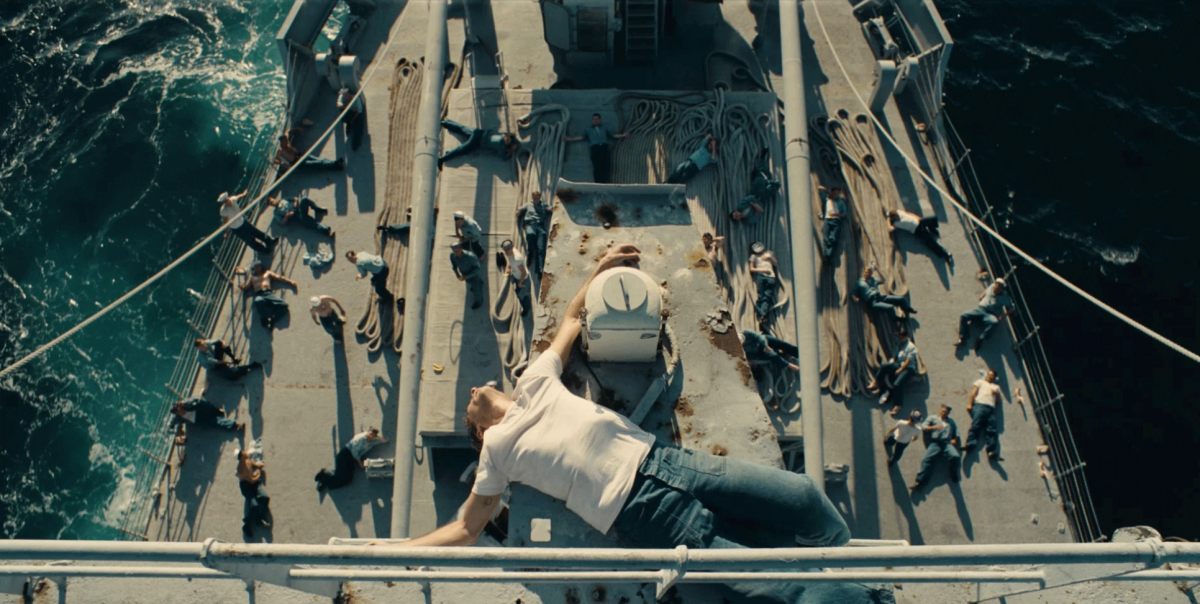 (4.5 / 5)
(4.5 / 5)
The Master is a difficult film to unreservedly love.
For one thing, it’s a far trickier beast than Paul Thomas Anderson’s previous world-beater, the relentless and aptly titled There Will Be Blood. There are no oil-rig explosions, no dairy beverage related analogies, though the film is certainly closer to it’s immediate predecessor in style, tone, and content than any other PTA’s directed.
There is the same sense of a tremendous driving force behind the film’s protagonist, in this case former seaman and life-long screw-up Freddie Quell, and the idea that they are moving towards something dark and life changing, potentially devastating. The question is whether or not he ever truly arrives there and what that means for the picture.
Both The Master and TWWB are based in part around the career-defining performances by their leads, in the former Daniel Day-Lewis’ irascible Daniel Plainview, here Joaquin Phoenix’s tormented Quell. As a performance, it’s enough to make you consider how much of Phoenix’s mockumentary I’m Still Here, documenting his apparent breakdown over a two-year period after retiring from acting, was actually faked.
Phoenix gives a genuinely remarkable performance as the World War 2 vet whose emotional problems, we sense, far predate his involvement in the conflict. Phoenix is all raw nerves, uneasy charm; a sneering, mumbling, profoundly broken human being.
But just as TWBB had Paul Dano’s preacher Eli Sunday as a counterpoint to Plainview, here Anderson introduces Lancaster Dodd, self-proclaimed leader of The Cause, played to perfection by Philip Seymour Hoffmann. As rough and misshapen as Freddie is, he nevertheless quickly forms an attachment to the polished and articulate Dodd, onto whose yacht he drunkenly stows away.
Dodd, famously based on Scientology founder L. Ron Hubbard, begins to employ the obviously troubled Freddie as a guinea pig in his Processing exercise, designed at helping man reach his full potential through overcoming past traumas. This is where the film plants its thematic flag.
Freddie’s violent and erratic behavior continues to degenerate, despite his claims of wanting to change, and Dodd, for all his claims of enlightenment, persists in swigging the toxic concoctions he has Freddie brew for him (hint: the secret ingredient is paint thinner). While in TWBB, the dueling forces represented would seem to be those of religion and industry, or perhaps traditionalism and progress, in The Master the battle would seem to be between mankind’s higher nature and his potential for bestiality.
Is Lancaster Dodd a charlatan? Is Freddie Quell salvageable? And what of Dodd’s wife, Peggy: might she, who ultimately rules Dodd’s heart and hearth, be the true master?
Or perhaps, as Dodd elliptically comments that all men have a master, the film is about the ultimate inability to achieve true self-realization. Freddie is a man so enthrall to his emotions that he repeatedly jeopardizes any chance that he might have at happiness of fulfillment – when he assaults a customer in the apartment store after a bad day, or is forced to flee a cabbage farm after his moonshine poisons a fellow migrant worker, you get the feel that Freddie has been running a long while and may well be running for the rest of his life.
Similarly, Dodd is, not without irony, addicted to the ideas, to the very principles he believes will set him free; whether or not it’s chicanery. After a while, it’s easy to see why two such very different men would hold such an allure for each other.
Some critics have dismissed The Master as baffling, but, though it is often obscure, I feel this misses the point of the piece. It is a grand and sprawling piece of cinema, one that encompasses religious mania and postwar ennui without ever truly being about any of it. It’s a journey without a destination, which, given where the film ends and a particular scene involving a trek across the desert, is perhaps apt.
There Will Be Blood is likewise about the self-made man, but if that film’s creed is, to quote Shakespeare, the binary “To be or not to be” then The Master’s would be the multi-valent “What a piece of work is a man”. At the heart of the film there is a tremendous ambivalence, as in Hamlet itself.
To return to more purely cinematic concerns, the film is beautifully shot by cinematographer Mihai Mălaimare Jr. Anderson’s roving camera defies you an objective take on proceedings and the sense of choreography is naturalistic and impeccable. I was lucky enough to see the film as a 70mm print, which may well still be showing at the West End Odeon for all those in the area. From the sandy Pacific beach on which the film opens to the blinding desert flats on which a choice is made, The Master is spellbindingly beautiful.
From the haunting orchestral score by Johnny Greenwood subliminally ticking over in the background to the faultless editing by Peter McNulty and previous Anderson collaborator Leslie Jones, The Master is truly a master class in ambitious thematic cinema.
With Day-Lewis already receiving plaudits for his performance as the eponymous President in Spielberg’s Lincoln, and with Phoenix having recently denounced the Oscars as “total bulls**t”, Anderson may not be able to repeat his success with the Academy in the acting category. Hoffmann and Adams are exemplary, but their performances lack the intensity and focality of Phoenix’s turn.
It’s impossibility to easily bracket, and indeed its ultimate indecipherability, may hinder its chances at Best Picture, too, despite its success in Venice. A lot of essays will undoubtedly be written about The Master – from its cinematography to it’s occasional opacity – and it deserves every one.
Safe to say, we won’t be seeing anything else like it in the cinema for a long time.
